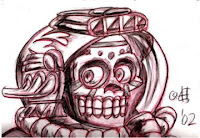by Ernest Hogan
Real life goes beyond the horrors of fictional dystopias. ‘68: The Mexican Autumn of the Tlatelolco Massacre, Paco Ignacio Taibo II’s memoir of the 1968 student movement in Mexico City that ends in the Tlatelolco massacre makes all the YA dystopias of the last decades look lame, and the characters are far more interesting. 1984 was a long time ago. Fahrenheit 451 is a nightmare for bookworms. Hunger Games? Back in the 1970s, as a teenager, I had to sign up for a lottery where I could have been sent off to a real life war . . .
I first encountered the writing of Paco Ignacio Taibo II on the campus of the Universidad Nacional Autónoma de México. I was just visiting, a turista. In some outdoor halls students were selling used books. There were some magazines with the words ciencia ficción. I got excited. On closer examination, they were two special issues of Comunidad CONACYT, the magazine of Consejo Nacional de Ciencia y Tecnología, that were devoted to science fiction. I bought them.
They were mostly articles about American science fiction, and the authors were quite knowledgeable. The language barrier is also a one-way mirror–they can see our side, we can’t see theirs. But there were also stories by Latin American authors. One that impressed me the most was by Paco Ignacio Taibo II–it was about the future of Mexico, and was quite dystopian, and rooted in and inspired by, reality.
Since then I have sought out more of Taibo’s works, and have not been disappointed, from his novels about detective Héctor Belascorarián Shayne, to his historical, and political nonfiction. I highly recommend him.
‘68 is short, but packed with juicy substance. It probably shouldn’t be read fast. A lot happens in each, brief chapter. More than you’ll find in a lot of fat novels.
He had meant to write a novel about the subject, but couldn’t. It probably would have been too much. And there's no romance, no happy endings, and the devastating ending, which after all is a massacre . . .
And the powers that be keep trying to erase it, which is the dystopian way.
Which is strange in this world where dystopia is a subgenre of escapist entertainment, youthful revolution is the stuff of video games, and people think everything is fake.
But then real revolutions happen in extreme slow motion, over decades, not in street brawls, but in the often dull places where laws, and minds are changed.
As Taibo put it: Demythification is not the only option. Another is remythication.
It’s all about messing with mythologies.
In the meantime, I recommend ‘68 to readers of Silvia Moreno-Garica’s excellent bestseller Velvet was the Night, to provide some context.
Ernest Hogan’s new story “Incident in the Global Barrio” will soon appear in El Porvenir, ¡Ya! Citlalzazanilli Mexicatl Chicano Science Fiction Anthology. ¡Chicano sci-fi refuses to die! ¡Viva Zazaismo!



No comments:
Post a Comment